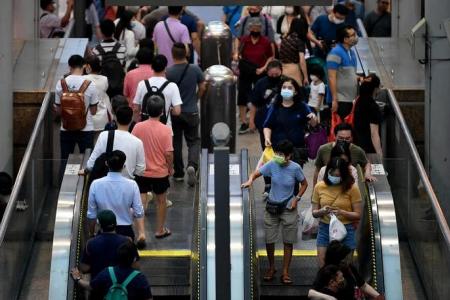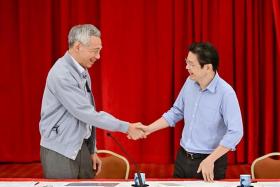NDR 2022: Masks will soon be optional, except on public transport and in clinics, hospitals
Masks will soon be required only on public transport and in healthcare settings such as hospitals, said Prime Minister Lee Hsien Loong on Sunday (Aug 21).
In his National Day Rally speech, PM Lee said the Covid-19 situation in Singapore had stabilised, and that relaxing mask requirements would help prevent fatigue from setting in.
"But don't take off your masks this very moment," he said, as details will be announced by Singapore's Multi-Ministry Covid-19 taskforce.
Currently, while masks are optional in outdoor settings, they are mandatory indoors, in places such as shopping malls.
With the reduced requirements, they will be optional in most indoor settings. But they will still be required on public transport, where people are in prolonged close contact in a crowded space; and in healthcare settings such as clinics, hospitals, and residential and nursing homes, where there are vulnerable persons, PM Lee said.
For schools in particular, masks should not be needed in class, he said.
"Children need to be able to see the facial expressions of their teachers and of each other, this is crucial for their learning and development," said PM Lee.
Experts in Singapore had suggested recently that there was no need to continue enforcing mandatory mask-wearing indoors, since over 90 per cent of the population has been vaccinated and over half the population has been infected with the virus.
In his speech on Sunday, PM Lee said people worked with one another, trusted the Government, and patiently endured rounds of easing and tightening of safe management measures.
Unlike other countries which see sharp spikes and declines in the number of Covid-19 cases, the Republic's Covid-19 waves grow and tail off more gradually, he said.
"In many other countries, when a wave happens, cases shoot up furiously and then crash down suddenly, like a roller coaster.
"And when cases shoot up hospitals come under a lot of pressure."
In Singapore, where the latest Omicron BA.5 wave is subsiding, waves grow and tail off more gradually, he pointed out.
"This suggests we have been effective in slowing down disease transmission."
This has helped the country spread out the impact and prevent hospitals from being overwhelmed, he added.
Singapore has recorded fewer than 1,600 Covid-19-related deaths so far.
Every death is one too many, but the death toll could have been higher if the Republic had suffered mortality rates similar to other countries.
"We could easily have suffered 10,000 Covid-19 deaths, or more," he said.
"Our collective efforts have saved many lives."
The high level of trust had been key to the country's success in tackling Covid-19, he added.
In some countries, a precaution as simple and essential as mask-wearing had become a heated point of contention.
"But in Singapore, people worked with and not against one another."
"You trusted your Government. You patiently endured rounds of easing and tightening despite the inconvenience," he said.
"The Government upheld your trust by being open and transparent. We spoke directly to you, shared information readily, and gave you the full facts even when things did not look good."
Above all, he added, there was a trust among Singaporeans that each would do the right thing and have each other's back.
For instance, people practised personal and social responsibility by getting vaccinated, practising hand hygiene, keeping their masks on indoors, and by self-testing and isolating when infected with Covid-19.
Meanwhile, people must be prepared to encounter more variants and waves, because the virus will remain for quite some time, he warned.
Stressing that Singapore must must learn from Covid-19, he said: "One day, the next pandemic will come. A new virus will emerge, more transmissible, more adaptable and more dangerous than Covid-19.
"And we must be ready for it."
The most important lesson was to maintain the spirit of exercising personal and social responsibility, he said.
"Continue to nurture trust in our society, day in day out, during normal times," PM Lee added. "So that during the next crisis, we can again draw upon a deep reservoir of trust to see us through, just like we have done during Covid-19."
Get The New Paper on your phone with the free TNP app. Download from the Apple App Store or Google Play Store now



